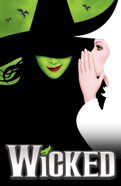CDs: Are You a Good Witch or a Bad Witch?
WICKED Decca Broadway
Wicked is the season's most intriguing success story. After doing strong business in previews, it opened to some sharply negative reviews in important places. Yet the show has continued to fill the vast Gershwin Theatre, and some now consider it the front-runner for the 2004 Best Musical Tony.
True, there's nothing unusual about a show receiving mixed-to-negative notices and thriving. But unlike several titles that, in recent years, have followed that pattern, Wicked was not previously a hit in London, nor was it based on a beloved animated or live-action film. Its source--Gregory Maguire's 1995 novel--is much admired but not widely known. So why has Wicked been doing so well? Surely the popularity of all things Oz-related has a good deal to do with it. The advertising slogans--"So much happened before Dorothy dropped in" and "the untold story of the Witches of Oz"--are perfect, as is the logo. Then too, there's something compelling about a show with two strong female leads, both of whom get to do a great deal of singing and emoting.
Wicked marks a mixed comeback for its composer-lyricist, Stephen Schwartz. He triumphed in the early '70s with Godspell, Pippin, and The Magic Show but subsequently flopped with The Baker's Wife, Working, Rags, and the London Children of Eden. Wicked shows signs of being Schwartz's first hit since the '70s. But in the Wicked reviews, Schwartz's score came in for some harsh criticism.
Much of that criticism is justified, or at least understandable, as the score does fail to rise to the level of imagination of its source. In both words and music, there's too much standard pop and pop opera for a story that cries out for something distinctive and magical. There are generic, faceless numbers the Elphaba-Fiyero duet "As Long as You're Mine" and others "I'm Not That Girl," "For Good" that only lightly reflect the characters and situations and seem to be aimed at pop charts. And heroine Elphaba has one too many power anthems, even if Idina Menzel, who sings the role, sounds like she could handle even more.
But if Wicked's score is easy to attack, Schwartz remains a strong melodist, and the Wicked tunes stay with you. Indeed, it's possible to disparage the style or sound of certain numbers yet find their melodies hard to resist. Elphaba's "The Wizard and I" and "Defying Gravity" may have so-so lyrics, but they've been provided with strong tunes and goose-bump vocals from Menzel, who's especially impressive at the end of both numbers. "Popular" is quite catchy and completely sold by Kristin Chenoweth who is ever going to be able to replace her Glinda?, and I like the ladies' feuding number, "What Is This Feeling?" If the second act songs are less rewarding than the earlier items, Schwartz's music features a couple of attractive, recurring melodic motifs, and the ensemble sequences "No One Mourns the Wicked," "Dancing Through Life," "One Short Day," "Thank Goodness" have fine central melodies.
Because Chenoweth scores so heavily in the comedy of Winnie Holzman's book, the actress's formidable star turn loses something on disc. But her singing is grand, effortlessly shifting from rangy soprano to show belt. If Joel Grey's big song, "Wonderful," isn't quite, Grey's voice is remarkably unchanged from the '60s. Carole Shelley's superb Madame Morrible has almost nothing to sing, while Norbert Leo Butz's Fiyero and Christopher Fitzgerald's Boq are vocally solid.
For the recording, which will be in stores on Tuesday, December 16, album producer Schwartz has had the string section augmented by seven players. The seventy-one-minute disc lacks the second-act "Wicked Witch of the East" sequence, which reduces the appearance on the recording of Michelle Federer's persuasive Nessarose. The booklet includes the lyrics and an introductory essay by Maguire. But there's no synopsis of the plot, and the recording otherwise strives not to give away the plot's twists and surprises.
Unlike Avenue Q, The Boy from Oz, Never Gonna Dance, or Taboo, Wicked possesses an all-new, full-bodied, story-based, stylistically traditional Broadway score, all of which makes the CD quite playable. Schwartz's music does improve with repeat hearings. And with all of its shortcomings, Wicked's score is more enjoyable than it has a right to be. Let's call it a guilty pleasure.
________________________________________________
For upcoming Q & A columns, please send questions by clicking on the byline above kenmanbway@aol.com.
